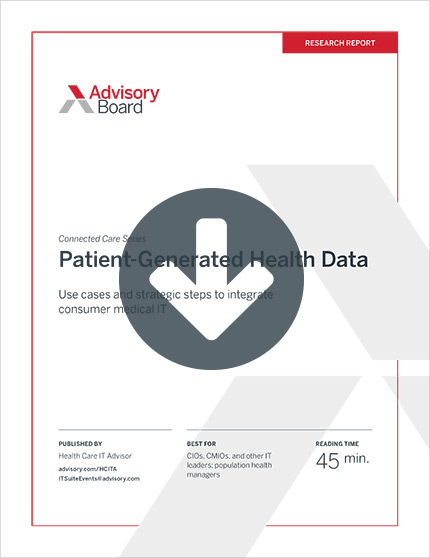Auto logout in seconds.
Continue LogoutA group of 14 major health systems in the United States have come together to form Truveta, a health data sharing company that aims to sell anonymized data on millions of patients to help companies develop new drugs and aid in medical research.
Just updated: Your digital health resource library
About Truveta
The 14 health systems that partnered to form Truveta are:
- AdventHealth;
- Advocate Aurora Health;
- Baptist Health of Northeast Florida;
- Bon Secours Mercy Health;
- CommonSpirit Health;
- Hawaii Pacific Health;
- Henry Ford Health System;
- Memorial Hermann Health System;
- Northwell Health;
- Novant Health;
- Providence Health System;
- Sentara Health;
- Tenet Health; and
- Trinity Health.
Together, the health systems span 40 states and provide about 13% of all clinical care in the United States, according to a spokesperson for Truveta.
According to Truveta, the company's goal is to allow its member health systems, U.S. researchers, and the federal government to run analyses and use machine learning on Truveta's collection of anonymized patient data to aid projects aiming to develop new drug therapies, make health care more efficient, improve health equity, create better artificial intelligence (AI) tools, and more.
Terry Myerson, CEO of Truveta and a former executive at Microsoft, said Truveta will invite other institutions to join the company in the future. "We want to enable ethical research by everyone against this unprecedented, statistically significant insight into U.S. health care," he said.
A focus on 'ethical' research projects
Myerson stressed that Truveta's health data will be used for "ethical" projects instead of marketing.
"Patient and physician targeting is not something we'd like to see this data used for," Myerson said. "We don't want you to walk out of a surgery and have three sales reps waiting for you to say, 'Please buy our knee brace.' We don't want people sitting outside physicians' homes encouraging them to sell more drugs," he added.
Instead, Myerson said Truveta wants "to bring scientific integrity and the inequities of health to the forefront," particularly when it comes to AI tools in health care.
"The market today does not facilitate any of that," he said. "If you're looking for data to train on, there is opacity as to where the data came from. And there's absolute opacity in terms of the demographics of the dataset, and it's not available at a sufficient scale to do any sort of fine cohorting."
Rod Hochman, CEO of Providence and chair-elect of the American Hospital Association, said the importance of utilizing data like Truveta's for research became especially apparent during America's coronavirus epidemic.
"Nothing has pointed it out more than the [epidemic]," he said. "The dearth of data [that we have now] is just making trying to do health care miserable."
So "[i]nstead of [health systems] just farming off all our data to a technology company somewhere, we've formed our own," Hochman said.
Myerson similarly said the epidemic was "a real eye-opener" when it came to the need for hosting health system data in one place and making it available for research. "This was like March, April. The stock market was crashed. Your kids are home. Everything's closed. Everyone's home. And it's like, we can't put data together" to address questions regarding Covid-19. "Truveta went from being a really good idea to an imperative for these health systems to create."
Pricing and privacy
Myerson said Truveta is still working on its pricing plans, and the company's fees may vary based on the entity seeking access to its data.
Truveta said that, as it ramps up, each health care provider involved with the organization "will assess how best to inform patients" of how their data will be used and their rights are under HIPAA. "Part of the goal is helping people understand the greater good and what this can do for them as a patient and improve their care," Myerson said.
"We are going to take every precaution necessary to be sure this is done correctly, and there are no privacy issues," Michael Dowling, CEO of Northwell Health, said (Mathews, Wall Street Journal, 2/11; Bass/Tozzi, Bloomberg, 2/11; Ross, STAT+, 2/17 [subscription required]).
Don't miss out on the latest Advisory Board insights
Create your free account to access 1 resource, including the latest research and webinars.
Want access without creating an account?
You have 1 free members-only resource remaining this month.
1 free members-only resources remaining
1 free members-only resources remaining
You've reached your limit of free insights
Become a member to access all of Advisory Board's resources, events, and experts
Never miss out on the latest innovative health care content tailored to you.
Benefits include:
You've reached your limit of free insights
Become a member to access all of Advisory Board's resources, events, and experts
Never miss out on the latest innovative health care content tailored to you.
Benefits include:
This content is available through your Curated Research partnership with Advisory Board. Click on ‘view this resource’ to read the full piece
Email ask@advisory.com to learn more
Click on ‘Become a Member’ to learn about the benefits of a Full-Access partnership with Advisory Board
Never miss out on the latest innovative health care content tailored to you.
Benefits Include:
This is for members only. Learn more.
Click on ‘Become a Member’ to learn about the benefits of a Full-Access partnership with Advisory Board
Never miss out on the latest innovative health care content tailored to you.

